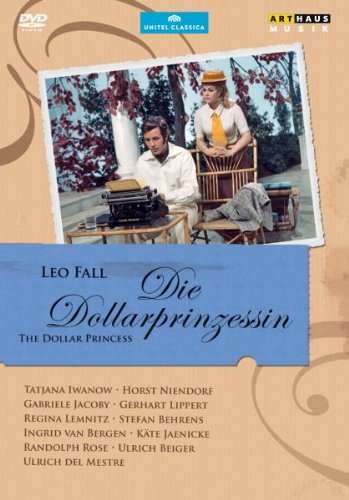|
Back
03/21/2012
Leo Fall: Die Dollarprinzessin
Tatjana Iwanow (Olga), Horst Niendorf (Couder), Gabriele Jacoby (Alice), Gerhard Lippert (Freddy Wehrburg), Regina Lemnitz (Daisy), Stefan Behrens (Hans von Schlick), Ingrid van Bergen (Dora), Käte Jaenicke (Miss Mibbs), Randolph Rose (Liftboy), Ulrich Beiger (Tom), Ulrich del Mestre (Dick), Wolfgang Spier (First Servant), Klaus Jägel (Second Servant), Symphony Orchestra Kurt Graunke (Munich), Bert Grund (Musical Director), Klaus Überall (Director), Kurt Berthold (Production Manager), Ted Kornowicz (Camera), Peter Scharff (Set Designer), Ingrid Zoré (Costume Designer), Emil Brandl (Choreography)
A production of Unitel Classica, and Filmed at the Berlin Union Film Studios in 1971 – 87’
Arthaus Musik Ref #: NTSC 101 624 – Booklet in English and German. Subtitles available in English, German and French

   
During the proximal span of 1870 to 1914 a wave of well-heeled American heiresses flooded the gates of Europe in search of a title to compliment their wealth. At a time when England’s aristocracy was mired in insurmountable debt and dilapidated castles, a lucrative dowry ‘across the pond’ would be welcoming for any duke or earl, thus ushering in the coined phrase “The Dollar Princess.”
A contemporary within the burgeoning populace of Viennese operetta, Leo Fall made his initial claim to fame in 1907 with his Der fidele Bauer that quickly followed with his triumphant creation of Die Dollarprinzessin. The latter’s launch at Vienna’s Carltheater on November 2, 1907 expounded upon novelties originating from Offenbach’s opéra-bouffe from the late 19th century including the opening’s use of typewriters. Die Dollarprinzessin was grounded by obscure playwrights Emmerich von Gatti Edler von Campofiore and Thilo von Trotha in which we see a turn-of-the-century affluent America act as a background rife with class issues, sexism and, ultimately, satirical qualities. Die Dollarprinzessin remains in the German repertory, yet the English and American adaptations are seldom seen (Ohio Light Opera performed it in 1995.)
This Unitel Classica DVD is a cinematic presentation rather than a recording of an actual stage performance. During the 1970s The United States brought back the so called, “television operetta”, showcasing notable musicals replete with catchy tunes and lively choreography saddled against pseudo realistic sets. Die Dollarprinzessin carries the enlightened verve of Stanley Donen’s Seven Brides for Seven Brothers, but because of limited editing sophistication, the audio is simply synched on top of the video in a demonstrably manufactured manner. The end equation is artificial palpability. Although these static touches lose credibility, the remaining vestiges have merited qualities.
All cast members’ acting is superb and well rehearsed. Coloring and costuming by Ingrid Zoré is beautifully executed, and the audio is keen. So, too, is the sharpness of picture. Choreography by Emil Brandl is pleasantly sufficient, exuding a feeling of dance numbers found on The Lawrence Welk Show, The Ed Sullivan Show or The Firestone Hour. Klaus Überall shot and directed Die Dollarprinzessin inside the Berlin Union Film studios, yet despite some splendid detailing of Peter Scharff’s sets, there’s a preponderance of plastic (i.e. leaves and palms) bringing to mind the word, “gauche.” The overall effect is two-dimensional.
Alan Seaton’s English translation forward is informative, but it lacks a very detailed synopsis. Nowhere is the physical setting of the operetta mentioned, nor mention of being on a boat (heading towards New York City), nor an understanding of how everybody ends up in Colorado.
The DVD chapters are only listed in German, yet the booklet contains German and English notations. German dialogue carries along in breakneck speed, and to those who are focusing on using English subtitles, this will detract from capturing content and plot on the first go around. There’s lots to digest, so it’s advisable to make a return visit. If one attempts to discern whether the movie parallels that of Fall’s original, it will be hard to find any clean cut delineations.
Putting Leo Fall on the map is welcoming, thanks to Arthaus Musik. Die Dollarprinzessin is highly entertaining but a bit hokey, kitschy and spurious. That’s okay if you like that sort of thing.
Christie Grimstad
|